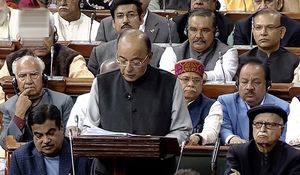The increasing criticism of Arun Jaitley’s budget by some of the prime minister’s official economic advisers has exposed the dynamic tensions that buffet the government on the way to the last year of its term. Governments have benefitted, but have also been damaged by arguments between the ‘impractical’ dreamers and the ‘narrow-visioned’ pragmatists. The dreamers who have wrinkled their nose at some of the budgetary provisions are NITI Aayog vice chairman Rajiv Kumar and two members of the prime minister’s economic advisory council, Surjit Bhalla and Rathin Roy. The chorus has been joined by Kumar’s predecessor and Columbia University economist Arvind Panagariya. The economists are riling against the pragmatist lobby led by Jaitley, Commerce and Industries Minister Suresh Prabhu and the key bureaucratic team led by finance secretary Hasmukh Adhia.
The economists are upset at the failure to stick to fiscal discipline, with Roy warning of a meltdown in ten years if the trend continues. Equally dramatic has been Bhalla, who said the long-term capital gains tax, a pet theme of Adhia, was absurd. Kumar has admitted that Make in India has not been a great success and expressed hope that increase in customs duties will be rolled back. Panagariya, who found the three-year stint at the NITI Aayog a bittersweet experience, has accused a new generation of bureaucrats of erecting protectionist walls again. Their collective dismay is about the harshness of the budget, which goes against Narendra Modi’s promise of more economic reforms. Panagariya had been unhappy about the expansion of governmental controls and activities, and had boldly advised the privatisation of loss-making public sector undertakings, starting with Air India.
The open airing of disagreement has been surprising, as Modi is not very appreciative of the expression of dissent by his team members. The official group, of course, is dismissing the criticism of the economists as a standard reaction of the reformers, who are not concerned about the realities faced by the political leadership and the administrative setup. Jaitley’s “harsh” measures and “inevitable” compromises, it is argued, are rooted in the electoral message from Gujarat and Rajasthan on low job creation and the demand for stronger security net in the agriculture and health sectors. They also argue that capital gains tax is aimed at parity with other incomes.
Interestingly, there are two levels of advice from the economic advisory council to the prime minister. One is from the four-member council, but above this responsibility, council chairman Bibek Debroy gives one-on-one advice to the prime minister, keeping it confidential even from fellow members. Debroy advises Modi also as a member of the NITI Aayog. As parliamentary committees spend the next three weeks debating the finer points of the budget, the warfare between the dreamers and the pragmatists can intensify.
sachi@theweek.in


